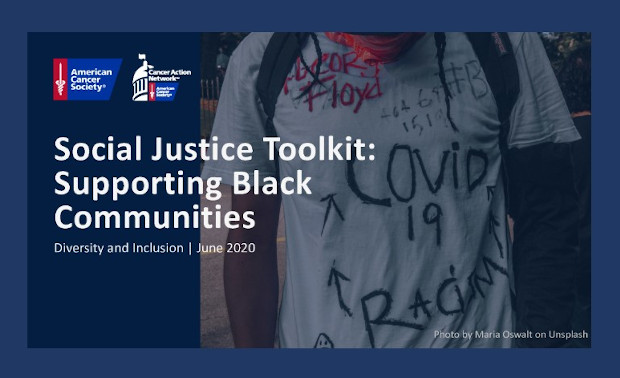On our June 16 ACS Day of Understanding Teams Live event, volunteers and staff were urged to be "anti-racist" and to take actions that will help rid our country of hundreds of years of systemic racism, a reference to the systems in place that create and maintain racial inequality in nearly every facet of life for people of color (e.g. housing, education, the legal system, work, health, etc.).
"When facing race today, one of most important things we need to remember is that it is not enough to be merely not racist," said award-winning author and speaker Dr. Avis Jones-DeWeever. "The opposite of racist is not being not racist, but explicitly anti-racist," she said. "It's not just about being friendly. It is about taking action to create change. That means you show up and speak out when you see something that looks discriminatory and help make sure change occurs."

When she asked participants, "What will you do to create change going forward?" they said: speak up when I see people being treated unfairly; continue to read and educate myself; actually show up at protests; grow my community to include people of color; not shy away from confronting ignorance and racism; call out my family members; lead by example; challenge staff/volunteers when they exhibit racism; and be a better ally.
Our CEO Gary Reedy said he is hopeful that "we have finally reached a tipping point" in this country, and that real change will take place. He said he and COO Kris Kim have been checking in with black members of our staff to see how they are doing. He said those conversations have taught him several things: "I have learned that racism has an impact on our staff on a daily basis and adds tremendous stress to their lives. They have grave concerns about their fathers, brothers, and sons. And, I also learned that they are grateful for the work we are doing in health disparities."
A special thank you to our three ACS staff members who shared personal experiences: Mel Toran, executive director, Southeast Region; Natasha Coleman, senior director, Cancer Control Strategic Partnerships, Northeast Region; and Kyle Brown-Latham, income support specialist, National Cancer Information Center (NCIC).
Mel said he "often times receives a look and receives less than optimal service" as a customer. He said the sustained energy of the people who have been protesting since the murder of George Floyd makes him optimistic – along "with the willingness of my colleagues to be part of the solution." He recommended a documentary and two children's books, which you can find in the list of resources below.
Natasha said she worries when her husband leaves their home. What if he is stopped by a police officer? She urged her fellow staffers to address social inequality within their own communities, and even in their ACS events.
Kyle shared that his dad was killed by a police officer 24 years ago, when he was 12. He asked staff to be introspective: "Are you contributing to this broken system? Look at the things you say and do. You may not feel like you have a part, but you do. We are the future of this country and we have a moral obligation to pull all members of society up and it starts with each and every one of us. Doing nothing accomplishes nothing."
RESOURCES
- Diversity and Inclusion Resource Guide (for staff and volunteers)
- Social Justice Toolkit: Supporting Black Communities (for staff and volunteers)
Mel's recommendations
Mel encouraged staff to educate themselves and recommended the documentary, The African Americans – Many Rivers to Cross. This six-part series by Henry Louis Gates depicts the beginning of the Slave Trade through modern times, covering many topics in between.
Noting that no one is born racist, Mel said children can be the difference makers. For parents looking for a way to have a conversation with their children, he recommended Let's Talk About Race by Julius Lester and Let the Children March by Monica Clark Robinson.
No comments:
Post a Comment